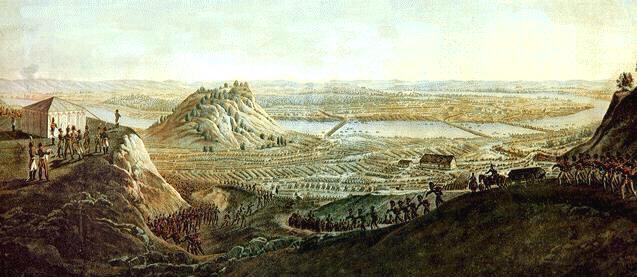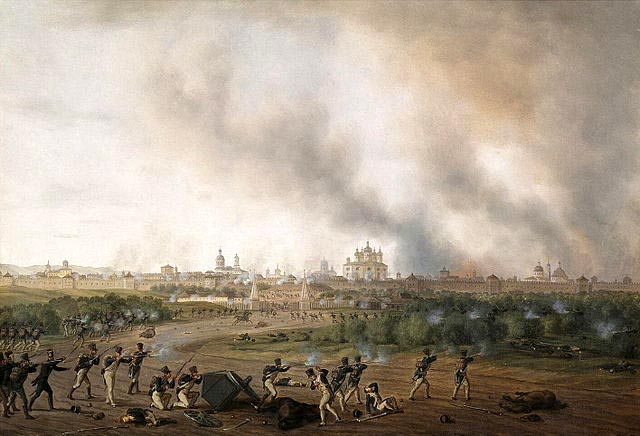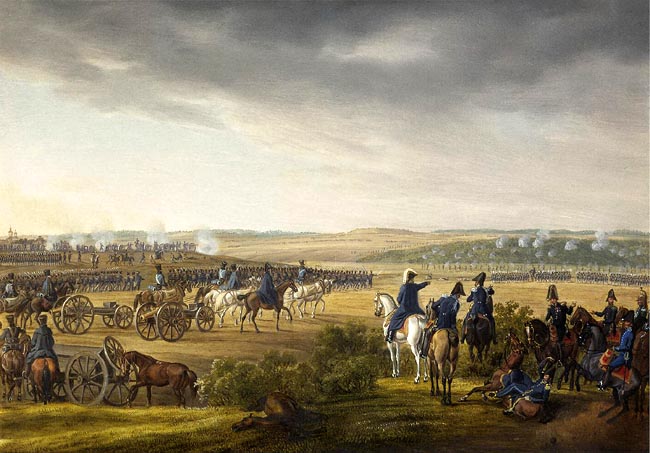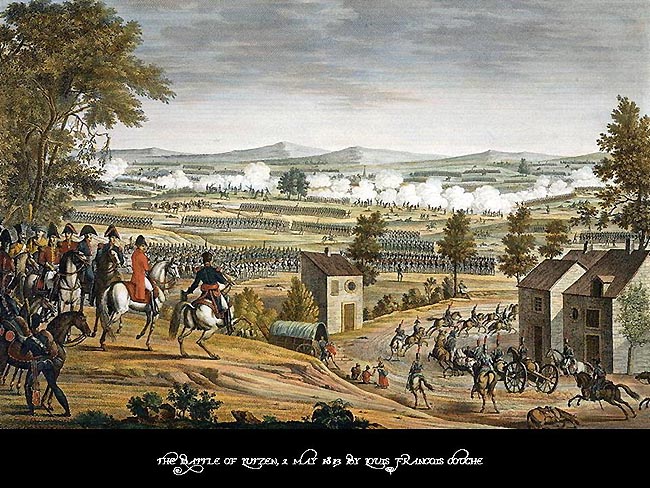Barclay de Tolly
| War Minister |
In the end of December, 1809 Barclay was called to St.Petersburg, and on January,20,1810 he was nominated the War Minister. On this post he improved the fortifications of fortresses of Kiev and Riga and began to built two new fortrsses in Bobruysk and Dinaburg. For his very useful and active service he was rewarded with the Order of St.Vladimir of the 1-st Class in September, 1811.
| The Campaign Of 1812 |
In 1812 Barclay returned to the Army again: he was appointed the Commander-in-Chief of the 1-st Western Army being the War Minister in the same time. This army had the main Headquarters in Vilno and consisted of 6 infantry Corps.
- the 1-st Coprs of Lieutenant-General Count Wittgenstein
- the 2-nd Corps of Lieutenant-General Baghowut
- the 3-rd Corps of Lieutenant-General Tuchkov
- the 4-th Corps of General Count Shuvalov
- the 5-th or Guard Corps of Tsesarevich Konstantin Pavlovich
- the 6-th of General of Infantry Dokhturov and also of three reserve Cavalry Corpss under the command of General Uvarov, Baron Korf and Count Pahlen.
Besides this in this Army was the mobile Cossak Corps of Ataman General of Cavalry Platov. The whole number was 127000 men and 558 guns.
Uncertainty of the place where Napoleon would enter into Russia made Russian Commanders-in-Chief dispose their Armies almost along all Western border of the Russian Empire: the 1-st Army was in Vilno Province, the 2-nd Army of Bagration consisted of 48000 of men and 216 guns stayed at Volkovysk, Novy Dvor and Zelva and the 3-rd Army of General Tormasov in that were 43000 men and 168 guns was near Lutsk. Ataman Platov with 16 Cossak regiments was in Grodno.
|
|
And on June,12 (24 - new style) 1812 Napoleon's Army crossed the river Neman and entered into the Russian territory. In the time of Napoleon's invasion the Russian troops were scattered on the space of 800 versts (1verst=3500 feet). There is a supposition that at first Barclay thought about a general battle, but he had to go back on this idea because the number of Napoleon's Grande Armee was much more bigger than it was supposed in the Russian Headquarters and at court.
It had been decided to retreat. The 1-st Western Army of Barclay retreated to Smolensk, and the 2-nd Army went there too to join the troops of Barclay. Barclay used the tactics that gave good results: he constantly imitated readiness to give a battle and quickly went away from the enemy. On July,22 both armies met in Smolensk. Bargration, though he was in the more senior rank, had come under the command of the War Minister.
Napoleon came to Smolensk and on August,5 ordered to attack it from different sides. The heavy fighting lasted all the day but Russian troops could hold the city.
Although the attacks of Napoleon's were repelled successfully and Bargation tried to convince Barclay to continue the defence of Smolensk persistently, the careful general decided to leave the city. He had considered his plan: the French Emperor could take the road to Moscow that the 2-nd Army was not able to protect.
|
|
On August, 6 -7 the Russian Army left Smolensk. This retreat provoked the violent dissatisfaction against Barclay in the Army and society, they blamed him for indecision, cowardice and even treason. Bagration hated Barclay and didn't believe him. From the first days of the war he couldn't speak about Barclay without fury and wrote the angry reports to the Tsar about Barclay's activities. The same talks were among other generals too. And all generals were worried about the constant hostility between Bagration and Barclay. And on August,5 (17 - new style) Alexander ordered to convoke a special committee, that proposed the Tsar to dismiss Barclay and appoint Kutuzov the Commander-in-Chief. But Alexander had made the final decision only 3 days after, on August ,8.
So that day Kutuzov was received by Alexander I and got a decree about his nomination the Commander-in-Chief. And the same day Barclay was dismissed from the post of the War Minister.
Loewenstein (one of Barclay's aides-de-camp) in his memories wrote about this:
"People and the Army were displeased with our retreat for a long time. Crowd that is unable and must not be initiated into the secrets of the serious military operations, saw in this retreat ignorance or cowardice. The Army shared this opinion partly, and it was necessary to have the firm temper of Barclay to stand the plan of this campaign without any wavering. Only Alexander who saw in this plan the rescuing of Russia supported him. But the Crowd always judges only by the first results and cannot wait.
The Emperor in the beginning of this war worried too about many Russian provinces had been given to the enemy. General Barclay had to calm the Emperor, and he entrusted me many times to write to His Majesty that the loss of some provinces will be compensated, and in summer when it was very hot, Barclay counted on winter frosts and prognosticated the terrible fate of the enemy if it would have courage and carelessness to invade into the territory of the Russian Empire further.
Barclay begged His Majesty to wait until November and he would answer for it with his life (in June!) that till November the French troops would have to leave Russia more hurriedly than they had come there."
After the appointment of Kutuzov the Commander-in-Chief of the Russian Army, on August,16 Barclay wrote to his wife:
"And about the appointment of Prince Kutuzov, it was necessary because the Emperor doesn't command all the Armies, but is this the good choice, only God knows. As about me, my patriotism doesn't allow any sense of insult".
Kutuzov that was very popular among people in St.Petersburg and in Moscow too was 67 years old then.
He was a very clever and talented general and he realized very clearly that Barclay's tactics in this war was the single possible in that situation, and he didn't hide it at all. Just after his appointment he nominated Barclay the commander of that part of the Russian Army he had commanded before Smolensk, and Bargation was appointed the commander of his part of the Army.
In the Borodino battle on August, 26 (September, 7 - new style) Barclay commanded the centre and the right wing of the Russian Army and amazed all by his coyrage and coolness. He came to the aid to Bagration when he was attacked by the troops of Marshals Ney and Davoust, attacked with the Cavalry the left wing of the French Army, and when Napoleon with his main forces rushed to the attack to the centre of the Russian Army, he supported it with his last reserves and led the troops by himself, he rode in front of them in the full general uniform, and the French Cavalry was coming. He led the cavalry mass into the attack by himself and fought as a common cavalryman.
|
|
On this day five horses were killed under him, two of his aides-de-camp and officers were killed and seven were wounded, his hat and cloak were shot through. His uniform was splashed with blood, two times he nearly was taken prisoner, but he had beaten off.
And only the coming darkness had put an end to this terrible massacre.
On September,1 Barclay took part in the council in Fili village, and he was the first who said about the retreat of the Russian Army from Moscow, and next day, September,2 (14 - new style) , Barclay made arrangemets with Marshal Murat about a truce to give the time to Moscow inhabitants to leave the city.
And on September,21 Barclay gave a report to Kutuzov about his leaving the army because of his illness, left the Army and went to Vladimir.
On the way to Vladimir in many places a crowd ran after his coach, threw stones at it and yelled insults. Sometimes police had to step in to stop the excesses of the crowd. Maybe, crowd is and was the same at all times and in all countries...
In the end of October Barclay sent to Alexander his "Explanations of General of Infantry Barclay de Tolly about the actions of the 1-st and 2-nd Western Armies during the campaign of 1812 " with the request of his permission to publish it, but he received a refusal.
Barclay lived in Vladimir till the end of November, then he decided to go to Beckhof, and after it he went to St.Petersburg, where in Alexander's birthday he came to the Winter Palace, but he met a very cold welcome there. But in this day Barclay got a letter from Alexander, in which he persuaded Barclay to return to the Army. After receiving the letter, Barclay went to his estate in Liflandia. There he had been ill for a month and then after some recovering he went to Vilno.
| The Campaign Of 1813 - 1814 |
In the beginning of 1813 Barclay with the Emperor Headquarters officers came to Polotsk and asked Alexander for resignation again.
But on January,31 he received a message from Kutuzov that Alexander had appointed General of Infantry Barclay de Tolly the commander of the 3-rd Army instead of Admiral Chichagov, who had fallen ill.
On April,17 Kutuzov had died and Count Wittgenstein was appointed the Commander-in-Chief. In the end of April - beginning of May there were bloody battles at Lutzen and Bautzen, that ended with Napoleon's victory and the retreat of the Allied Forces.
|
|
After these unsuccessful battles at Lutzen and Bautzen Wittgenstein was dismissed from the post of the Commander-in-Chief of the Allied Russian-Prussian troops and on May, 17 General of Infantry Barclay de Tolly was appointed the Commander-in-Chief. Now near 90 thousand men were under his command.
After Austria had entried into the war the Allied Forces were reorganized into three armies: the Bohemia Army, the Silesia Army and the Northern Army.
Barclay was under the command of commander of the Bohemian Army Prince Shwartzenberg, who was the Commander-in-Chief of all Allied Armies. Barclay commanded the Army Reserve consisted of Russian and Prussian Corps (126 thousand men).
In August the military action began again, but after the unsuccessful battle at Dresden the Allies troops retreated to Teplitz.
Barclay, who commanded the vanguard of the Bohemian Army, informed General Osterman-Tolstoy, who was in the South-East of Dresden, that the French Corps of General Vandamme was coming to Teplitz and they had an order to gain the rear of the Allies.
The first attack of Vandamme Corps was accepted by the Russian Guards under the command of Osterman-Tolstoy near Kulm. Next morning (August,18( Barclay came to Kulm who commanded the battle.
In this battle the Corps of Vandamme (about 12 thousand men) was captured with 84 guns and its transport. The Kulm battle was given on Barclay's initiative.
In the middle of September all Allies armies rushed to Leipzig, and the main forces of Napoleon approached there too.
On October,4 in the morning the troops of Barclay stayed on the right flank formed in three lines. In the first line was Wittgenstein's Corps, in the second - the Corps of Raevsky and in the third line was the reserve under the command of Tsesarevich Konstantin Pavlovich. Barclay's troops had to attack the main forces of Napoleon's troops that stayed at Wahau village and to throw them back to Leipzig.
In the first stage of the battle the Russian-Prussian troops seized Wahau and Cleberg. But Napoleon had concentrated about a hundred of guns beyond Wahau and opened fire to Barclay's troops and in the same time the French Infantry rushed to the attack. Barclay moved Raevsky's Corps forward supporting the troops that were attacking Wahau.




